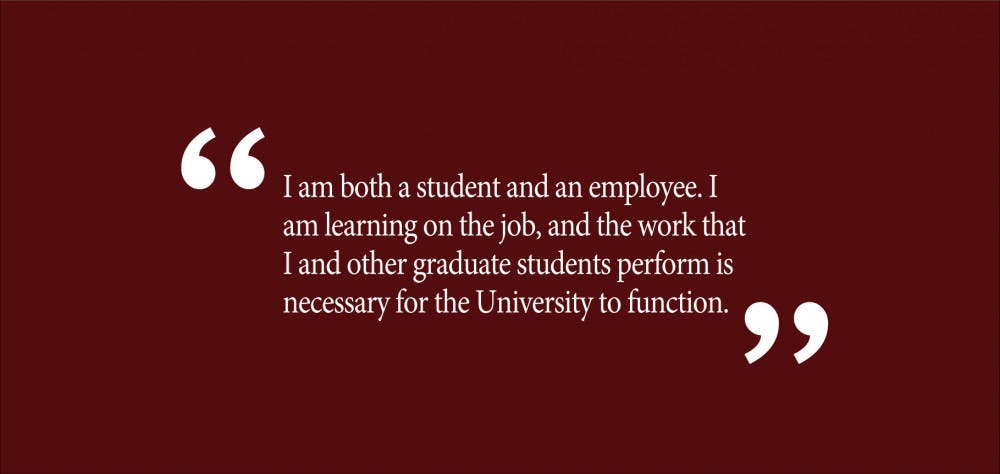One of the most frustrating things about pursuing my PhD is having to explain to friends and family members, repeatedly, what I actually do all day. No, I do not have the summer off. Yes, I do get paid. No, I am not going to be a neurosurgeon when this is all over (sorry, Mom).
What my friends and family members do understand, however, is that I seem to be working all the time. As part of my work as a graduate research assistant, I design and implement experiments, generate and analyze data and present my work at scientific meetings. The data I generate are used in grants and awards, bringing in money for the University. The experiments I perform and the work I do aren’t arbitrary learning exercises — they generate real knowledge for the benefit of the University and the scientific community. This is why the most recent proposed rule from the National Labor Relations Board has been so hard to understand. This new rule would overturn a 2016 decision which gave graduate student employees at private universities the right to form unions.
The NLRB’s proposed rule claims that I am a student, and therefore cannot be an employee. In my experience, the previous decision on this issue made by the board had it right: I am both a student and an employee. I am learning on the job, and the work that I and other graduate students perform is necessary for the University to function. If there were no graduate student employees at Brown, the University would need to hire people in our place. Otherwise, classes would not get taught, papers and exams would not be graded and laboratories would cease to run.
Last November, a majority of grads at Brown voted to unionize. A few months later, I was elected to serve on the Bargaining Committee, which is tasked with writing and negotiating a contract to improve the working environment for grad students in every department. Right now, many graduate student employees are unhappy with their working conditions. Teaching assistants have no control over their class sizes, and as a result, often spend far more time teaching and grading than doing the research that they came to graduate school to do. Grad students have also described issues with existing university policies to address sexual harassment and discrimination. Graduate students who are also parents report having trouble making ends meet with our low stipends and the high cost of childcare and dependent healthcare.
The Bargaining Committee has been hard at work to address these issues, developing a contract that provides graduate student employees with adequate healthcare, protections from harassment and discrimination, support for graduate parents and better pay. However, this new rule from the NLRB threatens the hard work we have already done.
If the rule passes, the University would no longer be obligated to recognize our vote to form a union. This rule would not necessarily prevent the University from continuing to bargain with us in good faith to develop a contract. If the rule does pass, it is still possible that the University could recognize our unionization without being obligated to do so by NLRB. This is unlikely, however, based on the University’s track record with graduate unionization. It is therefore essential to preserve the 2016 NLRB in order to maintain our rights as workers.
The NLRB is currently accepting public feedback on its proposed rule until Nov. 26, so it’s particularly important for anyone who supports the right of graduate student employees to unionize to speak out now. To show my objection to the NLRB’s proposal, I submitted a comment under a petition organized by the AFT Academics, which can be found at https://aftacademics.org/weareworkers/ and will be sent directly to the NLRB.
Yesterday, Stand Up for Graduate Student Employees staged a rally on the Main Green to show the University that our unionization effort is here to stay. We listened to speakers from Brown Dining Services, the Providence City Council and an employee at the Brown University Library, who let the University know that we have support from workers throughout the campus and the city itself. But right now, SUGSE needs support from students in our effort to oppose the NLRB’s new rule.
Kaitlyn Hajdarovic GS can be reached at kaitlyn_hajdarovic@brown.edu. Please send responses to this opinion to letters@browndailyherald.com and op-eds to opinions@browndailyherald.com.





